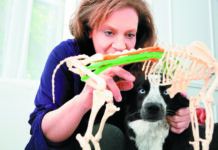Librela injections for arthritis
Q: We have an 11-year-old pit bull mix who has a moderate case of arthritis in his legs and shoulders. We have tried cold laser therapy once a week for a few months, but the positive effects fade after a few days. We also have tried a few pain and anti-inflammatory medications prescribed by our veterinarian, but our dog, Ipo, gets digestive upset from all of them. Now our vet is suggesting Librela injections once a month; he highly recommends them. But since Librela is relatively new (especially to us), we would love to see what your veterinary team thinks about its safety, side effects, and efficacy. Thank you.
Fixing a Dog’s Injured Rotator Cuff
You play tennis long enough, you will likely tear your rotator cuff,” says Tufts veterinary orthopedist Michael Kowaleski, DVM. “A dog does dog things long enough — landing on his front legs jumping down the stairs, and so on — and the shoulder cuff can eventually get torn that way, too.”
A Surefire Way to Ratchet Down Your Dog’s Pain
When your dog is off leash and won’t come back to you, your natural inclination may be to yell or show exasperation in some other way. It’s understandable. Dogs are faster than we are, and it induces anxiety when they’re in a situation that we can’t control physically. But doing a quick self-check and taking the lead by acting calmly will always serve your pet — and you — better. He’s more likely to return to you if he sees you’re not angry. He’ll be more likely to comply in general if you don’t make a bad situation worse by exhibiting displeasure that will only leave him anxious or confused. But were you aware that not losing it with a hand-wringing response will also serve your dog when he is in pain?
Dental Sealants to Help Your Dog Avoid Gum Disease?
When a person gets dental sealants, they are applied directly to the chewing surfaces of the teeth — the molars, specifically — to help prevent cavities and other forms of dental disease. The teeth have little fissures, or grooves, that trap food residue (often sticky in nature) and pave the way for tooth decay. The sealants keep the grooves covered and may stay in place for a person’s lifetime.
Genetically Mapping Canine Cancers Can Help Save Dogs’ Lives
In human medicine, genetic mapping of tumors that have already metastasized has added years to the lives of cancer patients who otherwise would have been near death. By understanding the exact nature of the genetic mutation that caused the cancer, scientists have been able to develop drugs that target malignant tumors with incredible precision, effectively pushing back the advance of life-threatening disease. Now, veterinary researchers have begun the process of pinning down the genomes of tumors in dogs.
You’re Still Not Giving Your Dog Heartworm Preventives?
More than six out of 10 dogs participating in research known as the Golden Retriever Lifetime Study had not previously been on heartworm preventives, according to research funded by the Morris Animal Foundation. While the investigation was just on one breed, it’s safe to assume this alarming statistic applies to other breeds (and mixed breeds) as well.
Integrative Geriatrics for Your Senior Dog?
“I always wanted to be a veterinarian,” Dr. Narda Robinson says, “but it just seemed like too much of a heartbreak.” So she went to medical school, practiced on people for a few years, then finally accepted that “what I really needed to do with my life was work with animals,” she remarks.
When Your Dog Starts Squinting
Some dogs start squinting in sunny weather as they age. It’s almost always nothing to worry about. There’s a sphincter muscle in the iris (the part that gives the eye its color), and it normally takes down the size of the pupil (the dark circle in the middle of the eye) to let in less light when the sun is shining bright. But as a dog ages, the sphincter muscle may not work as well, and too much light gets in. Ergo, the squinting.
New Treatment for Canine Epilepsy
Epilepsy, a condition of recurring seizures for which a cause most frequently cannot be found, is the most common neurological disorder seen in dogs. It affects an estimated one in 20 of them. In the past, veterinarians often prescribed unapproved phenobarbital tablets from the human drug marketplace to help control seizures. But the Food and Drug Administration has just conditionally approved phenobarbital for our canine pets. The drug manufacturer has five years to be granted full approval by moving evidence for the drug’s effectiveness and safety from “expected” to fully “demonstrated.”
New to the “Top 10 Toxins” List for Dogs: Recreational Drugs
For the very first time, recreational drugs have made the ASPCA’s top 10 list of toxins for dogs and other pets. This includes not only marijuana-based products but also hallucinogenic mushrooms and cocaine, although marijuana makes up the lion’s share.
When Will It Be Your Dog’s Turn in the Emergency Room?
Something’s terribly wrong with your dog, and you take her to the off-hours emergency clinic. But how long will you sit there before she gets seen?
Canine Vaccine Hesitancy Can Put Your Dog — and You — at Serious Risk
In developing countries where vaccination against rabies is not readily available for dogs, thousands of people die of rabies every year because the disease can be transmitted from canines to humans. In the U.S., only a handful of people contract rabies from their dogs each year. But that could change.
















